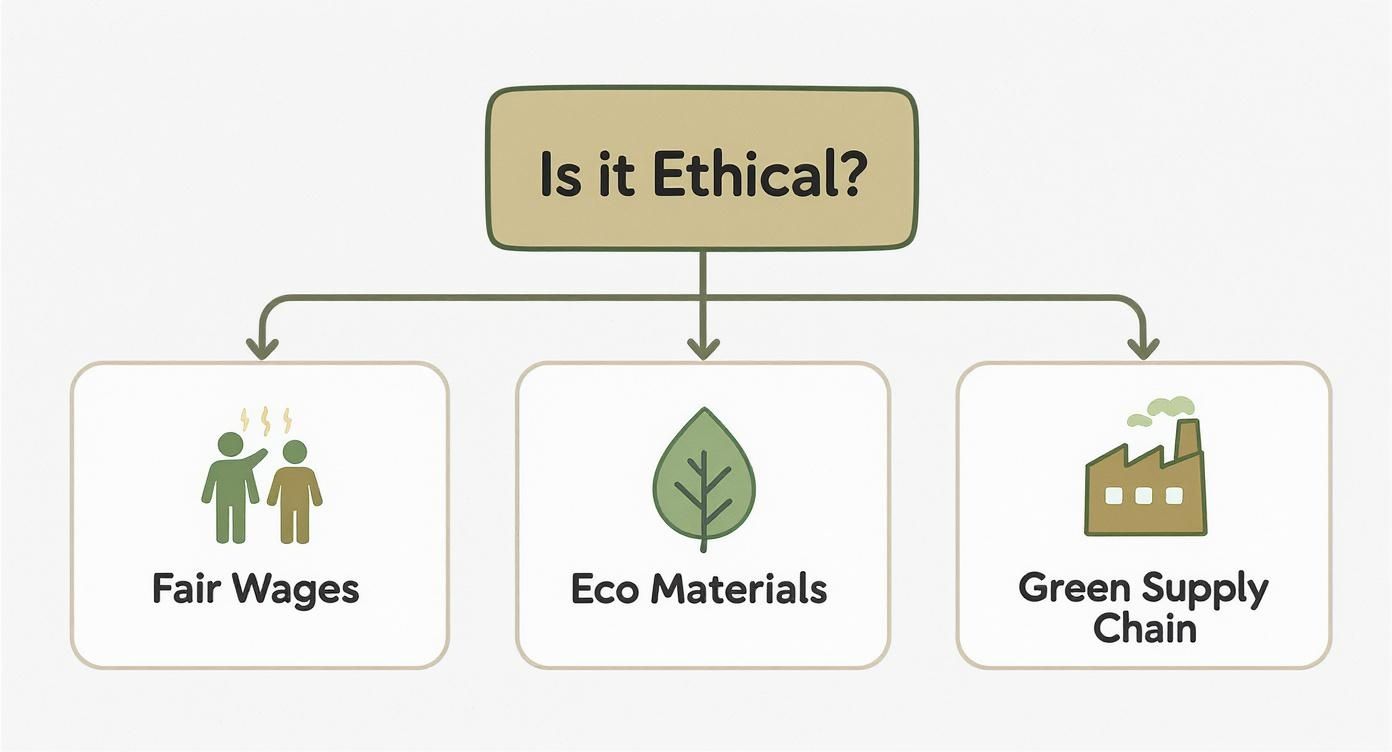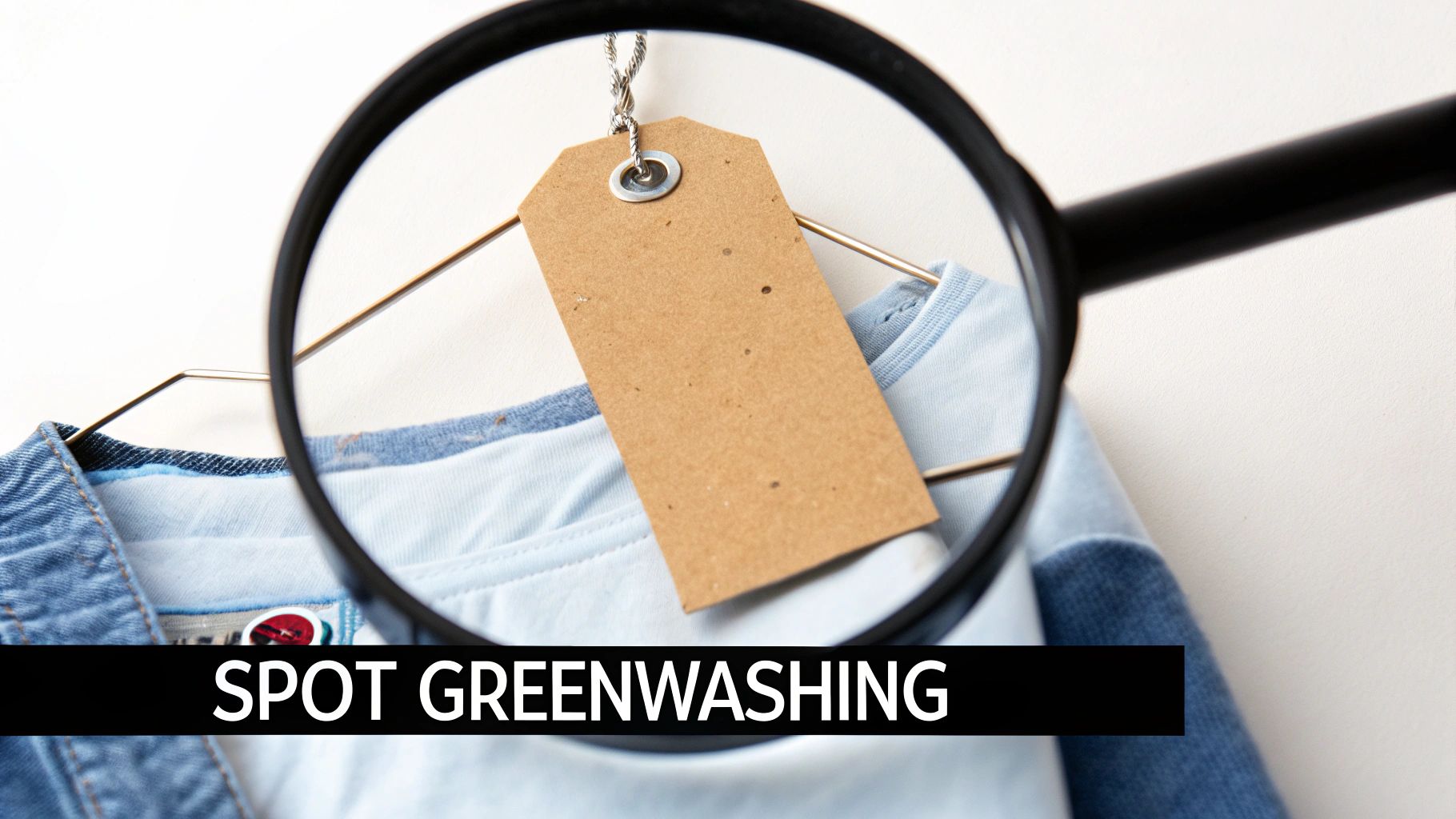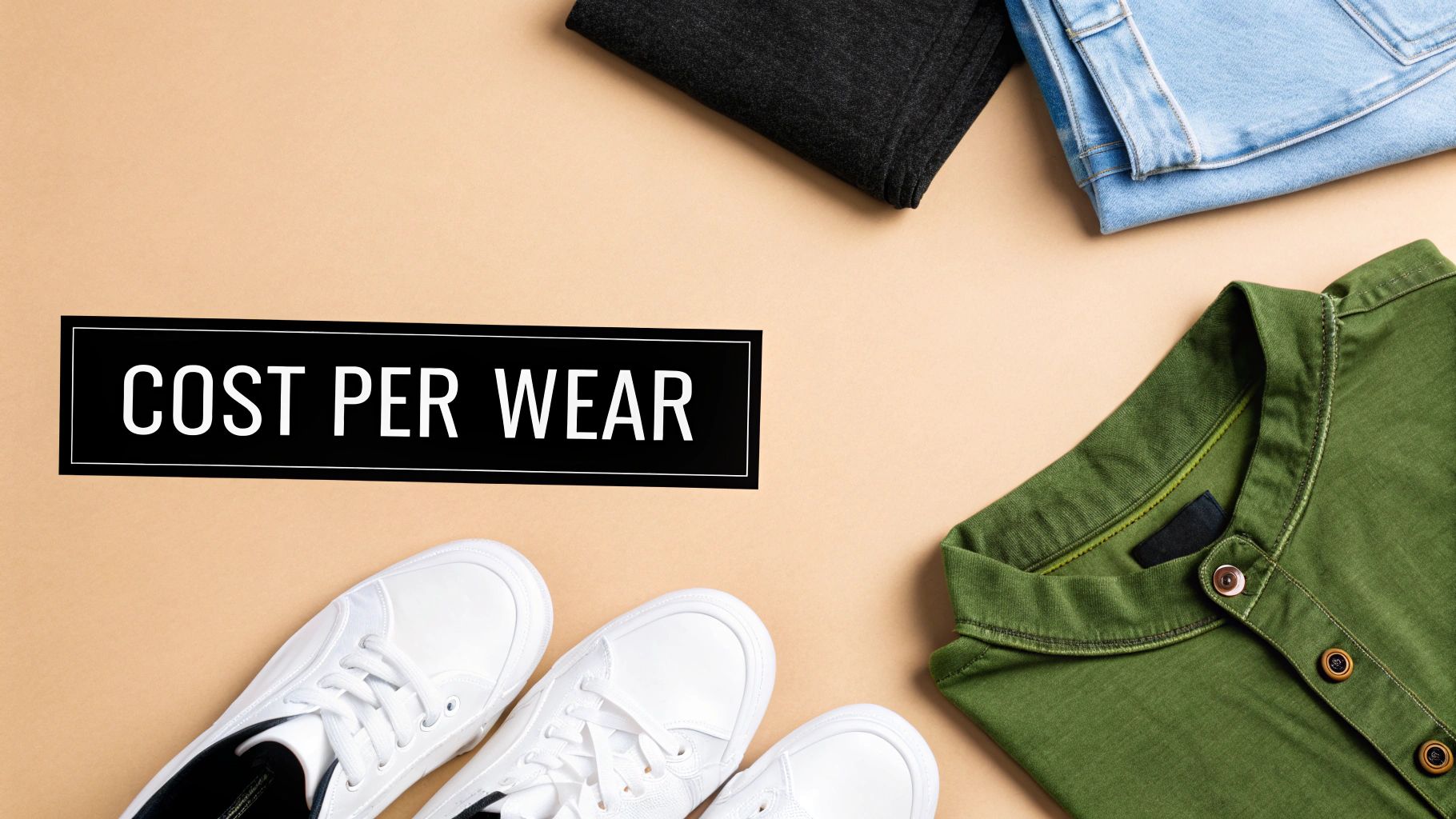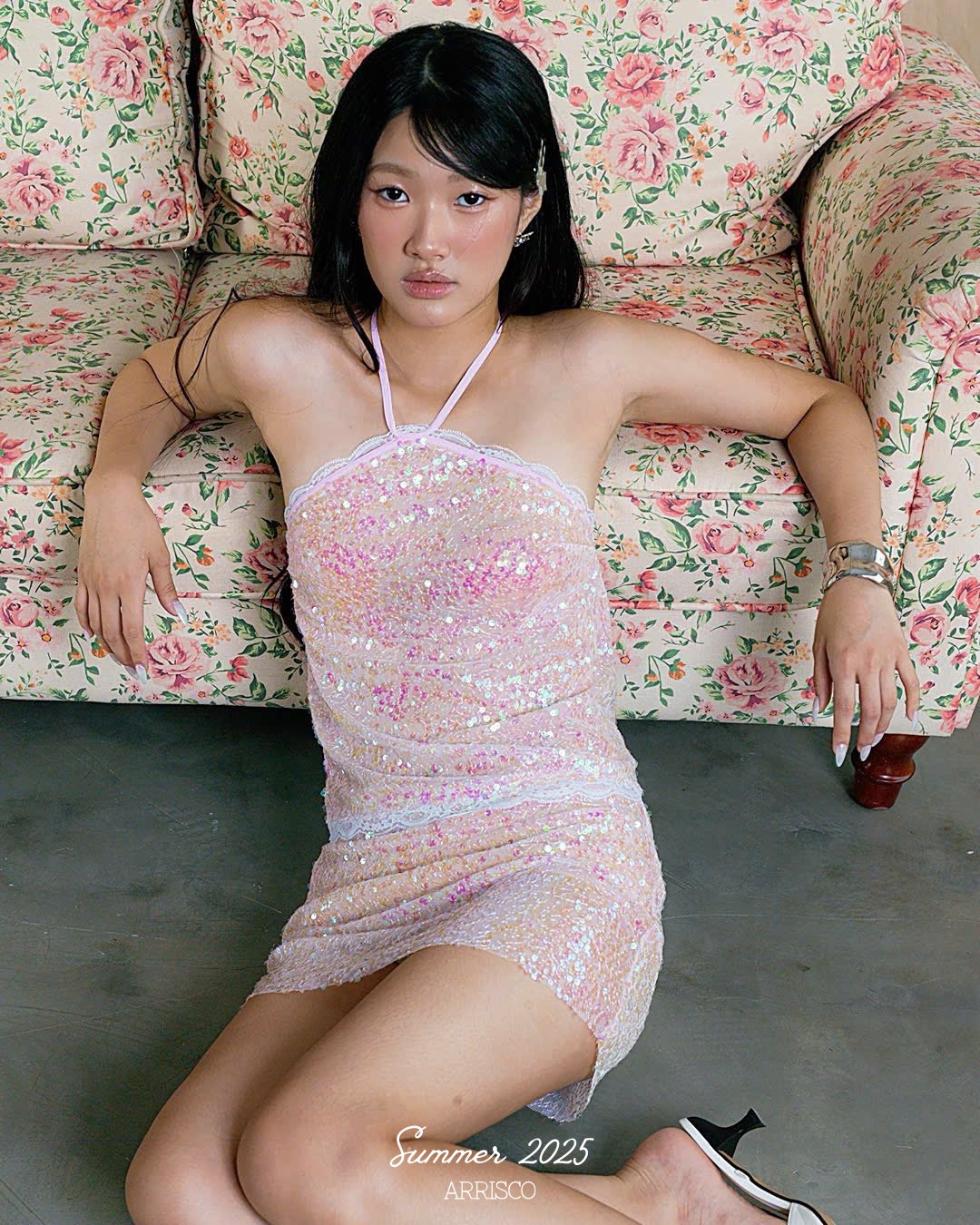Ever wonder what makes an online clothing store truly "ethical"? It's a term that gets thrown around a lot, but it goes way beyond just using organic cotton. Ethical brands are the ones putting people and the planet front and center, creating fashion that feels as good to wear as it does to buy.
They're the rebels of the fashion world, pushing back hard against the apathetic, high-speed machine of fast fashion. Instead, they're all about fair wages, clean materials, and a genuine respect for the environment every step of the way.
What Are Ethical Online Clothing Stores, Really?
Let’s break it down. Think of fast fashion as the industrial-scale factory farm of the apparel world—it’s all about churning out massive quantities at lightning speed, no matter the cost to workers or the environment.
Ethical fashion, on the other hand, is like your local, organic farm. It's built on a deep respect for the people who grow the food (or in this case, sew the clothes), the health of the land, and the amazing quality of the final product. It’s a completely different philosophy.
This isn't just a minor difference in business models; it's a moral standpoint. The global clothing industry, as starkly revealed in the 2015 documentary The True Cost, has a dark side built on exploitation. The insatiable hunger for cheap, disposable trends has fueled a system with a devastating human and environmental toll. Ethical brands are the ones on the front lines, fighting to build a better way forward.
To get a real feel for what ethical fashion is all about, you have to understand the core ideas behind embracing sustainability in e-commerce. At its heart, this whole movement is built on three powerful, interconnected pillars.
The Three Pillars Of Ethical Fashion
When a brand calls itself "ethical," it shouldn't just be a slick marketing label. It's a promise—a total commitment to running their business with integrity. This commitment has to run through the entire operation, from the moment a seed is planted for cotton to the package that lands on your doorstep.
This complete, all-in approach is what separates the real deal from the brands just trying to look good. A truly ethical brand's identity is woven from its dedication to these three key areas:
- Fair Labor and Safe Conditions: This is all about the people. It means garment workers aren't just paid, they're paid a living wage. It means their workplaces are safe and healthy, and their fundamental rights are respected. It’s about seeing and honoring the human hands behind every single seam.
- Sustainable and Eco-Conscious Materials: The fabrics we wear matter. A lot. Ethical brands are obsessed with sourcing better materials, like GOTS-certified organic cotton that slashes water usage and ditches toxic pesticides, or amazing innovative textiles made from recycled plastics.
- Environmental Responsibility: This pillar looks at the big picture. It’s about tackling the fashion industry's massive environmental footprint by minimizing water pollution from toxic dyes, cutting carbon emissions from factories and shipping, and—most importantly—designing beautiful clothes that are built to last, not to be tossed out after a season.
The global fashion industry is an exploitative system that manufactures and sells desire. Our choices about what we wear raise profound questions about responsibility, freedom, and the ethics of covering our flesh in a globalized world.
Fast Fashion vs Ethical Fashion At a Glance
It can be tough to spot the differences on the surface, but when you look at how these two models operate, the contrast is night and day. Here's a quick breakdown to help you see the fundamental divide.
| Characteristic | Fast Fashion | Ethical Fashion |
|---|---|---|
| Production Speed | Extremely rapid; new styles weekly | Slow and intentional; seasonal or timeless collections |
| Labor Practices | Low wages, poor conditions, often exploitative | Fair living wages, safe conditions, worker empowerment |
| Material Sourcing | Synthetic, cheap fabrics (polyester, nylon) | Sustainable, natural, or recycled materials |
| Quality & Durability | Designed to be disposable, falls apart quickly | Made to last, high-quality craftsmanship |
| Environmental Impact | High pollution, massive waste, huge carbon footprint | Minimal environmental impact, focus on circularity |
| Transparency | Opaque and complex supply chains | Transparent; tells you who made your clothes |
This table really just scratches the surface, but it highlights the core values (or lack thereof) that drive each system.
Ultimately, every time you choose to buy from an ethical online store, you're making a powerful statement. You're saying no to the throwaway culture of fast fashion and casting a vote for a kinder, more thoughtful, and genuinely sustainable future for everyone. Getting a handle on the deep-seated differences in the slow fashion vs fast fashion debate is the perfect first step on this incredible journey.
How to Spot the Truly Ethical Brands
Alright, you've got the basics down. Now it's time to put on your fashion detective hat! Diving into the world of ethical online clothing stores can feel like a lot at first—so many logos, so many claims. But trust me, with a few key things to look for, you'll be able to cut through the noise and find the brands that are actually walking the talk.
It’s a bit like reading the ingredients on your food. You wouldn't just grab a box because it screams "healthy," right? You’d flip it over and look for real, tangible proof. The same goes for fashion. A genuine commitment to ethics isn't just a vibe; it's backed by transparency and solid verification.
Decoding the Labels of Legitimacy
When you're vetting a brand, certifications are your absolute best friend. These aren't just pretty little badges for a website; they represent rigorous, third-party audits that prove a company is hitting high standards for both people and the planet. Think of them as a clear sign that a brand has put in the work.
As you browse a product page or a brand's "About Us" section, keep an eye out for these power players:
- Fair Trade Certified™: This is the gold standard for human rights. Seeing this label means the artisans and workers behind the product earned a fair wage and worked in safe conditions. A piece of the profit goes right back to them and their communities.
- Global Organic Textile Standard (GOTS): If you spot this, you know the fabric is legit. GOTS guarantees that a textile is made with at least 70% certified organic fibers and that the entire journey—from dyeing to finishing—was handled in an environmentally and socially responsible way.
- B Corp Certification: This one is a huge deal. Why? Because it looks at the entire company, not just one product line. B Corps are legally required to weigh the impact of their decisions on everyone involved: workers, customers, suppliers, the community, and the environment. It's a holistic stamp of approval for businesses built to do good.
Finding these labels is a fantastic first step. It shows a brand is willing to be held accountable by someone else, and that speaks volumes.
Looking for Radical Transparency Beyond the Certs
While certifications are a huge help, they're only one part of the story. The most trustworthy ethical online clothing stores are radically transparent. They don't just tell you they’re doing good—they show you.
This infographic breaks it down beautifully, giving you a quick way to check a brand's ethical foundations.

As you can see, true ethics is a three-legged stool: fair labor, sustainable materials, and responsible production. A brand has to be solid in all three areas to be the real deal.
So, where do you find this info? Start digging around their website for a "Sustainability," "Our Impact," or "Ethical Production" page. A brand that's genuinely proud of its practices will have this information front and center. You're looking for specifics, not vague promises.
A truly ethical brand doesn't hide its supply chain. They are open and proud to share the stories of the people who make their clothes and the materials they use, demonstrating a genuine commitment to their values.
Here are some green flags to watch for:
- Detailed Factory Info: Do they actually name their factories? Do they share details about wages and working conditions? Some of the best brands even publish their full factory list for everyone to see.
- Clear Material Sourcing: They should be able to explain why they chose a particular material. Look for info on water usage for their cotton, the closed-loop process for their TENCEL™, or where they get their recycled fabrics.
- Measurable Goals: Do they have public targets for reducing their carbon footprint or water usage? A brand that tracks and reports its progress is one that's serious about making a real difference.
Getting into this habit of investigating is a huge part of becoming a more mindful shopper. For even more tips, check out our guide on how to shop for clothes online with intention. By asking the right questions and knowing what to look for, you’re empowering yourself to support the brands that are truly building a better future for fashion.
The Real Impact of Your Ethical Purchases
Let's be real: choosing an ethical online clothing store is about so much more than just clicking "add to cart." It’s a powerful statement. Every time you consciously choose a garment, you're casting a vote for a fashion industry that’s kinder, cleaner, and fairer for everyone involved. That one choice sends a ripple of positive change across the globe, touching individual lives and helping heal our planet.
This isn't just some fringe movement, either. The demand for ethical fashion is gaining serious momentum, creating real economic proof that shoppers are putting their money where their values are. This collective voice is fueling incredible growth, and it's all because of people like you.
From Individual Lives to Global Change
Think about the story behind a single t-shirt. When you grab one from a fast-fashion giant, its story might be one of exploitation—a garment worker in a dangerous factory, unable to make a living wage to feed their family. But when you buy from ethical online clothing stores, you get to completely rewrite that narrative.
Suddenly, your purchase becomes a force for good. It means the person who stitched your shirt can afford to send their kids to school. It means they work in a safe, dignified place where their rights are actually respected. This is the profound, human side of your decision—turning a simple shopping trip into a genuine act of solidarity.
Your shopping choices have the power to create a chain reaction of positive impact, empowering workers, supporting communities, and contributing to a more equitable world. Each ethical purchase is a small revolution.
And this incredible transformation isn't just about people; it's about big wins for our planet, too. The fashion industry is notorious for being one of the world's biggest polluters, but your choices can directly fight back.
- Saving Precious Water: Choosing a dress made from organic cotton instead of the conventional stuff can save literally thousands of liters of water. That one simple switch helps preserve a vital resource for communities and entire ecosystems.
- Keeping Oceans Clean: When you opt for natural fibers like linen or TENCEL™ instead of synthetics like polyester, you're helping prevent a flood of harmful microplastics from shedding in the wash and polluting our waterways.
- Fighting Deforestation: Supporting brands that use sustainable materials like recycled fabrics or responsibly sourced wood-pulp textiles eases the pressure on our ancient forests, which are too often clear-cut for cheap fabric production.
A Movement Gaining Serious Momentum
The collective power of all these individual choices is truly reshaping the industry. As more and more of us demand transparency and accountability, brands are being forced to listen up and change their ways. We're creating a market that values ethics just as much as aesthetics.
The global ethical fashion market is exploding, and online stores are a huge part of that. The market was valued at around $9.48 billion and is projected to rocket to $13.32 billion, growing at an impressive 8.9% each year. This surge is a direct result of shoppers getting smarter and using online platforms to find and champion brands that do things right. You can find more details on the growth of the ethical fashion market and see just how big this is getting.
This is more than just a passing trend; it’s a fundamental shift in how we think about what we wear. Ethical shopping isn’t about sacrifice or missing out. It's an incredibly rewarding way to wear your values and actively build a better world. By learning about the principles of sustainable fashion for women, you can make every new piece in your wardrobe a meaningful one.
Spotting Greenwashing and Misleading Claims

As you start exploring ethical online clothing stores, you'll run into a big, flashy roadblock: greenwashing. It's everywhere. Suddenly, every fashion label under the sun is "eco-friendly," but scratch beneath the surface, and you'll find many of them aren't walking the walk.
Greenwashing is the frustrating marketing ploy where brands make themselves sound way more environmentally friendly than they actually are. It's designed to trick you, the well-meaning shopper, into buying their products.
Think of it like a candy bar company slapping "all-natural" on the wrapper when the ingredients list is a mile long and full of junk. In fashion, this looks like brands using earthy colors and vague buzzwords to paint a picture of sustainability, all while their core business model is anything but. Learning to see past this green smokescreen is probably the most important skill you can have in your conscious consumer toolkit.
Common Greenwashing Tactics to Watch For
Once you know the classic moves, greenwashing becomes so much easier to call out. These companies are banking on you not looking too closely, but a little bit of scrutiny makes their claims fall flat.
Keep an eye out for vague, fluffy language that means absolutely nothing. Words like "eco-friendly," "conscious," and "green" are thrown around like confetti, but without any real proof, they're just empty marketing speak. What makes a t-shirt "conscious," anyway? If they can't tell you, that's a huge red flag.
Another sneaky trick is focusing on one tiny positive thing to distract from a mountain of negatives. A fast-fashion brand might brag about a "sustainable collection" made with recycled materials, conveniently ignoring the fact that they still churn out millions of other garments in terrible factory conditions. It's a classic bait-and-switch.
Greenwashing is a tactic that exploits consumer goodwill. A brand's true commitment isn't found in its slogans, but in its transparent actions and verifiable data.
And don't forget the visuals! Brands are masters at creating a vibe. They'll use nature-inspired imagery, earthy color palettes, and eco-sounding product names to make you feel like you're making a good choice. This isn't necessarily bad on its own, but when it isn't backed by any real action, it's pure deception. A green tag doesn't make a garment green.
Your Greenwashing Detector Checklist
Ready to become a greenwashing detective? It's easier than you think. Before you click "add to cart" on a new brand, just run through this quick mental checklist. These questions will help you separate the genuinely good guys from the fakers.
- Is the Language Vague or Specific? Look for the proof! A brand that says "we care about the planet" is talking a big game. A brand that says "our organic cotton uses 91% less water than conventional cotton" is showing you the receipts. Specifics are your best friend.
- Are There Third-Party Certifications? As we talked about, official seals like GOTS, Fair Trade, or B Corp are gold. They prove an independent organization has audited the brand and is holding them accountable. No certifications? Be skeptical.
- Is the Brand Transparent About Its Whole Supply Chain? If a brand only wants to talk about its recycled mailer bags but gets quiet when you ask about its factory workers, they're probably hiding something. True sustainability is about the whole picture, from farm to closet. The challenges within fashion industry ethics are tough, and brands that are open about them are the ones to trust.
- Is the Business Model Based on Overconsumption? This is the big one. If a brand is dropping 52+ micro-seasons a year and constantly pushing you to buy the next new thing, it's not sustainable. Period. The most ethical brands encourage you to buy less and choose well.
Our Favorite Ethical Online Clothing Stores
Alright, are you ready to discover your new favorite brand? Diving into the world of conscious fashion is an incredible adventure, and we're here to be your guide. Think of this less as a list and more as a handpicked collection of amazing ethical online clothing stores that perfectly nail the balance between stunning style and real-deal substance.
We're going way beyond just surface-level claims to show you what truly makes each of these brands a leader in the slow fashion movement. You’ll find a fantastic mix of options for every vibe and budget, from those timeless minimalist pieces to bold, artistic designs that turn heads for all the right reasons.
For every brand, we’ll get into the nitty-gritty of what makes them special. We're talking about their game-changing use of low-impact materials, their shockingly honest approach to supply chain transparency, or how they directly support artisan communities across the globe. This is your ultimate resource for finding brands you can feel genuinely awesome about supporting.
Brands That Champion People and Planet
The most inspiring brands don't just see sustainability as a box to tick—it's woven into the very fabric of who they are. They're living proof that you never have to sacrifice looking good for doing good. These companies are truly setting a new gold standard for the fashion industry.
A total legend in this space is Patagonia. As a certified B Corp, they've been pioneers in environmental activism for decades. They're famous for their "Worn Wear" program, which encourages you to repair and reuse your gear, throwing a direct challenge to the throwaway culture of fast fashion. Plus, their commitment to using recycled materials and donating 1% of sales to environmental causes is iconic.
Then you have ABLE, a brand with a powerful mission to empower women. They don't just pay fair wages; they publish their lowest wages for the world to see, pushing for radical transparency. Their beautifully crafted leather goods and classic apparel are made by women who have overcome incredible challenges, making every single purchase a direct investment in female empowerment.
And for all the minimalists out there, you have to know about Kotn. They work directly with cotton farmers in Egypt to help rebuild the local industry, guaranteeing fair prices and better livelihoods. Their entire supply chain, from the farm to the final stitch, is transparent and traceable. The result? Unbelievably soft, high-quality basics you'll want to live in for years to come.
Innovators in Sustainable Materials
The future of fashion is being dreamed up in the world of textiles, and some brands are on the absolute cutting edge of this revolution. They are sourcing and creating fabrics that aren’t just beautiful but are also dramatically kinder to our planet. These innovators are totally redefining what's possible for your closet.
A huge standout here is Outerknown. Co-founded by pro surfer Kelly Slater, this brand is obsessed with sustainability. They're best known for their ECONYL® clothing, a regenerated nylon made from salvaged fishing nets and other ocean plastic. They literally turn a major source of pollution into stylish, super-durable clothing. How cool is that?
Another fantastic choice is Pact, which makes finding affordable organic basics an absolute breeze. They are GOTS certified, which means their entire cotton supply chain meets the strictest organic and social standards out there. By choosing Pact, you’re backing farming practices that use up to 81% less water than conventional cotton farming.
Ethical fashion is not just a trend; it's a growing economic force. The shift in consumer values is pushing the industry toward a more sustainable and responsible future, driven by the accessibility of ethical online clothing stores.
This massive shift in what we, as shoppers, demand is having a huge economic impact. The sustainable fashion market, which is dominated by ethical online clothing stores, was valued at $8.1 billion and is projected to explode to $33.1 billion. This incredible growth is happening because online shops make it easier than ever to find and support brands that reflect our values. You can dive deeper by checking out the latest sustainable fashion market insights.
Artisan-Crafted and Community-Focused
Finally, some of the most special ethical brands build their entire mission around preserving traditional craftsmanship and lifting up artisan communities. These are the brands that create a direct, personal link between you and the person who made your clothes, resulting in unique, story-rich pieces you'll cherish forever.
- Nisolo: This B Corp creates absolutely stunning, ethically made shoes and accessories handcrafted in Peru and Mexico. They ensure fair wages and safe working conditions and even provide financial literacy training for their artisans, creating a lasting positive impact.
- Ten Thousand Villages: As a true pioneer of the fair trade movement, this non-profit offers a beautiful collection of clothing and accessories made by independent, small-scale artisan groups from all over the world. Every purchase you make directly supports these talented makers.
- Mata Traders: This Chicago-based brand partners with artisan co-ops in India and Nepal to create vibrant, vintage-inspired dresses and jewelry. They are fiercely dedicated to fighting gender inequality by providing stable, empowering jobs for female artisans.
Each of these brands opens a window into a better, more thoughtful way of doing fashion. By choosing to support them, you aren't just building a more beautiful wardrobe—you're actively becoming part of a global movement for positive change.
How to Build an Ethical Wardrobe on a Budget

Let's get one thing straight right away: building a sustainable wardrobe isn't just for people with deep pockets. That's a huge myth! I get why people think that—you see a higher price tag on a beautifully made piece and instantly feel like it's out of reach. But honestly, an ethical wardrobe is totally achievable for everyone.
The real secret isn't about spending more money; it's about shifting your entire mindset. It’s about consciously stepping off the fast-fashion hamster wheel of "buy, wear, toss" and falling back in love with your clothes. It's about curating a closet of pieces you'll cherish for years.
Embrace the Power of Cost-Per-Wear
Okay, let's talk about my favorite hack for budget-friendly ethical fashion: cost-per-wear. This simple little calculation will completely change how you look at price tags.
Instead of seeing a $150 ethically made coat as just "expensive," think about its lifespan. If it's a timeless, high-quality piece you'll throw on 150 times over the next few years, its cost-per-wear is a mere $1. Now, picture that trendy $30 fast-fashion jacket that looks worn out after five wears. Suddenly, its cost-per-wear is a staggering $6!
Investing in one durable, high-quality garment is often far more economical in the long run than buying five cheap, disposable ones. Quality truly pays for itself over time.
See what happened there? The "cheaper" item was actually the more expensive one. Focusing on cost-per-wear pushes you to prioritize quality and longevity, which are the absolute cornerstones of a truly sustainable wardrobe.
Master the Art of Secondhand Shopping
The secondhand market is absolutely exploding, and it is your single best friend for building an ethical wardrobe without draining your bank account. Thrifting, whether you're digging through racks in a local shop or scrolling online, is the ultimate win-win. You give gorgeous clothes a second chance at life and keep them out of a landfill.
Platforms like ThredUP, Poshmark, and Depop have made it ridiculously easy to find incredible pre-loved gems. You can find high-quality pieces from top-tier ethical online clothing stores for a tiny fraction of what they cost new.
Here are a few pro tips for navigating the online thrift world:
- Set Up Alerts: Know exactly what you're looking for? Create saved searches and alerts for specific brands or items. You'll be the first to know when your dream piece pops up.
- Check Measurements: Sizing can be all over the place, especially with vintage or international brands. Always, always check the measurements to get the perfect fit.
- Inspect Photos Carefully: Zoom in on those pictures! Look for any signs of wear and tear. A good seller will be upfront about an item's condition.
This approach not only saves you a ton of cash but also helps slow down the demand for new production. If you want to become a true thrifting expert, our ultimate guide to shopping secondhand is packed with even more tips to help you find those amazing treasures.
Explore Creative and Affordable Alternatives
Beyond buying new or used, there are so many other fun ways to refresh your style that don't cost a fortune or compromise your values.
Ever tried a clothing swap? You can organize one with friends or find a larger community event. It's an awesome way to trade clothes you've fallen out of love with for something "new-to-you"—for free! Another brilliant option is fashion rental services like Rent the Runway. You can borrow incredible designer pieces for a special event, getting that high-fashion feel without the high-end price tag.
The growing excitement around these options is driving some serious market growth. The global sustainable fashion market was valued at an impressive $9.19 billion and is projected to nearly double to $17.77 billion. This boom is largely thanks to ethical online clothing stores rising to meet our collective demand for better fashion.
Got Questions About Ethical Fashion? Let's Talk!
As you start exploring the incredible world of ethical online clothing stores, it's completely natural for questions to pop up. In fact, that's a great sign! It means you're thinking critically and really engaging with the movement. Let's tackle some of the most common ones so you can feel totally confident as you shop with purpose.
This isn't about being perfect; it's about making progress. Think of this as your friendly guide to navigating those last few uncertainties.
Are Ethical Clothes Always More Expensive?
It's true, the upfront price tag can sometimes look a little higher. But the real secret is thinking in terms of "cost per wear." Seriously, this changes everything! Ethically made clothes are built with amazing materials and expert craftsmanship, so they're designed to outlast their fast-fashion equivalents by years.
Because they're so durable, you end up buying way less over time, which often saves you a ton of money in the long run. Plus, that price reflects the real cost of making clothes—paying garment workers a fair, living wage and using methods that don't harm our planet. You can see how transparent pricing models ensure fairness for workers for everyone along the supply chain.
A higher upfront cost often signals a deeper investment in quality, longevity, and human dignity. It's a price that reflects the true value of a garment, from the hands that made it to the planet it impacts.
How Can I Really Know If a Brand Is Ethical?
This is a fantastic question, and the answer almost always comes down to one simple thing: transparency. A genuinely ethical brand has absolutely nothing to hide. Your first stop should be their website—look for a page labeled "Sustainability," "Our Impact," or something similar.
Are they giving you specific, concrete details? Do they name their factories? Talk about wages? Explain where their materials come from? Keep an eye out for those gold-standard third-party certifications we talked about, like Fair Trade, GOTS, or B Corp. If you see a lot of vague, fluffy language but no real substance, that's a red flag. Truly ethical brands are proud of how they operate and can't wait to tell you all about it.
What Is the Single Most Important Thing to Look For?
If you have to boil it all down to one thing, I'd say it's radical transparency. While every part of the ethical puzzle is important—from materials to wages—a brand's willingness to be completely open is the ultimate sign of their commitment.
A company doing things the right way won't hide its supply chain behind a curtain of secrecy. They’ll openly and proudly share the stories of their makers and the journey of their clothes. When a brand is that open, it shows a deep-seated commitment to its values, which is what gives you, the shopper, the power to make a truly meaningful choice.
At Arrisco, we believe that every conscious choice can make a world of difference. Our collections are designed to blend timeless style with an unwavering commitment to ethical production, so you can build a wardrobe you absolutely love and feel amazing about wearing.
Explore our latest collection and start your ethical fashion journey with Arrisco today.




























